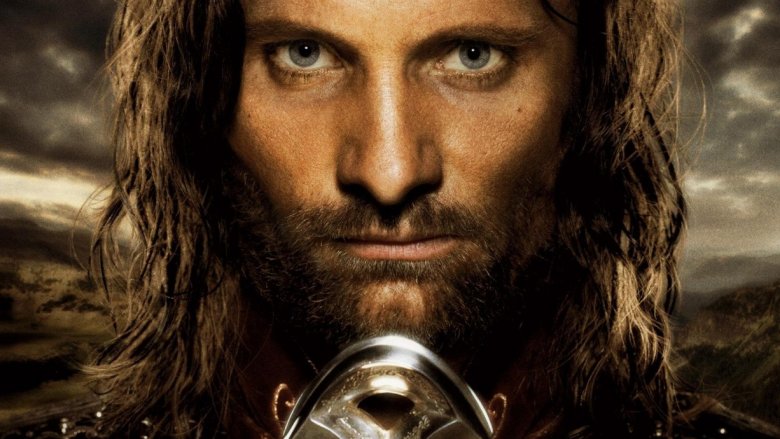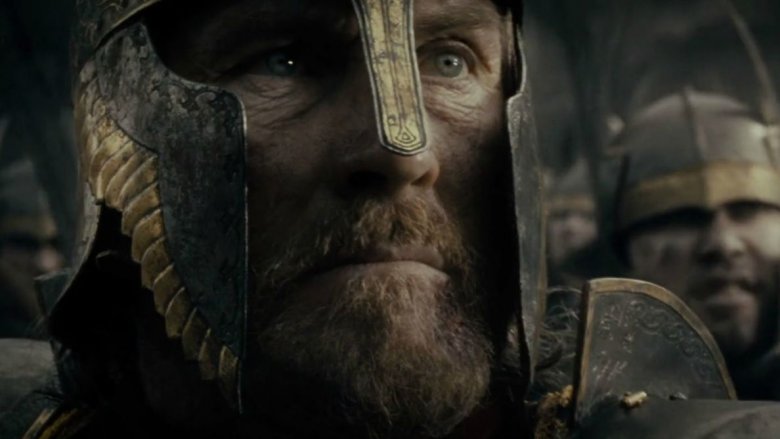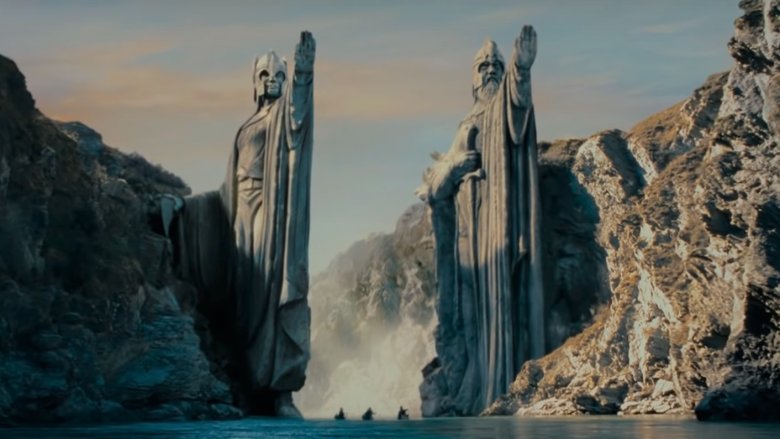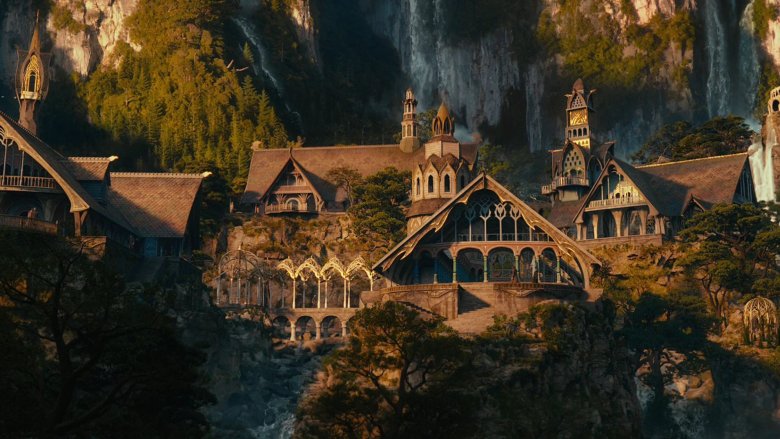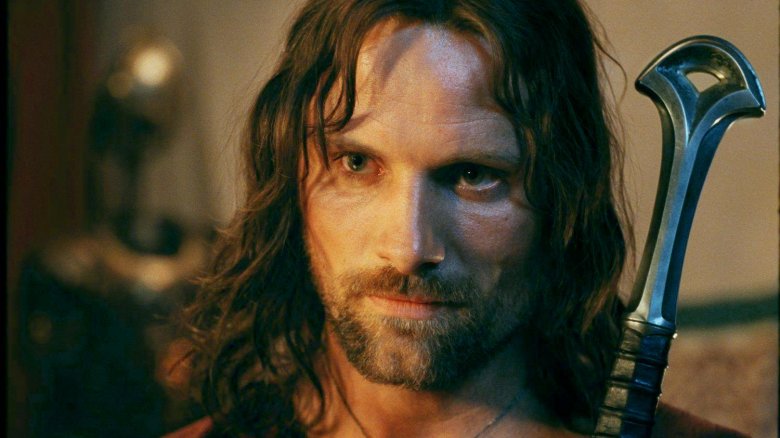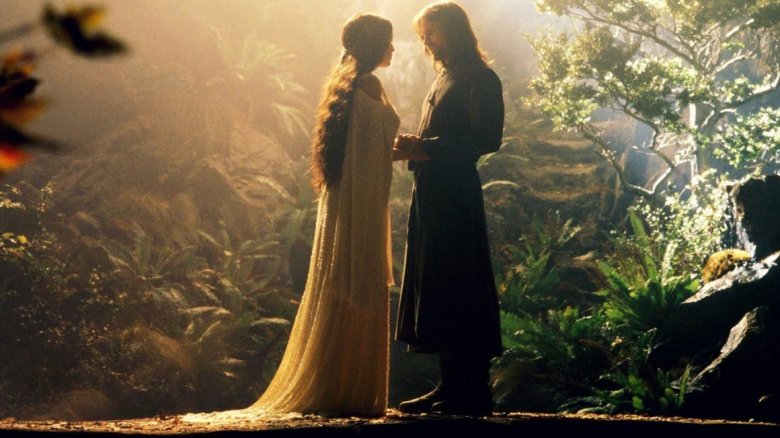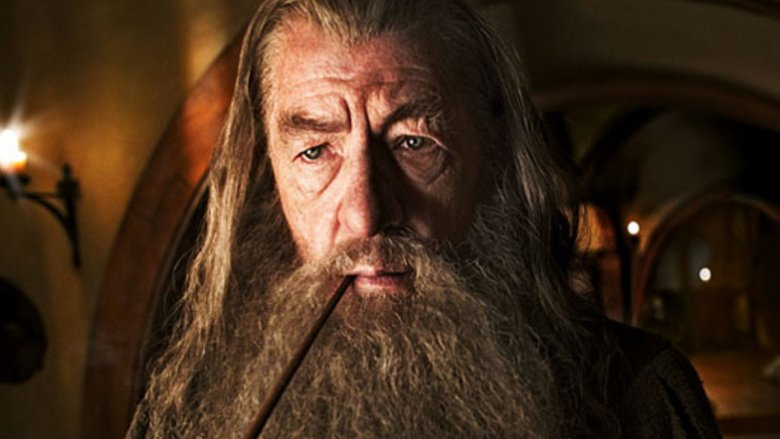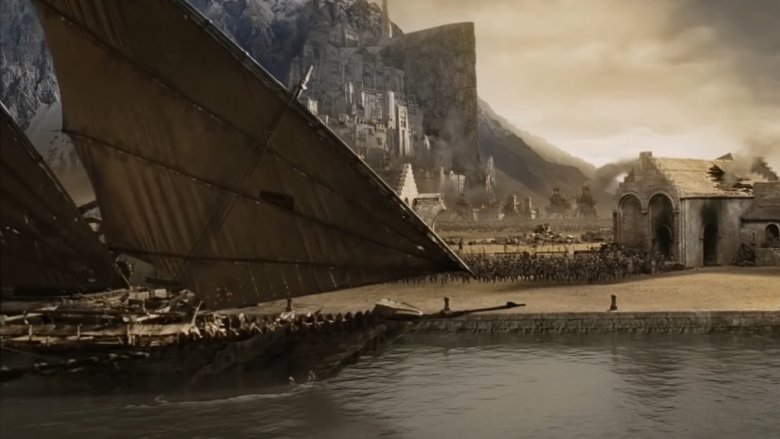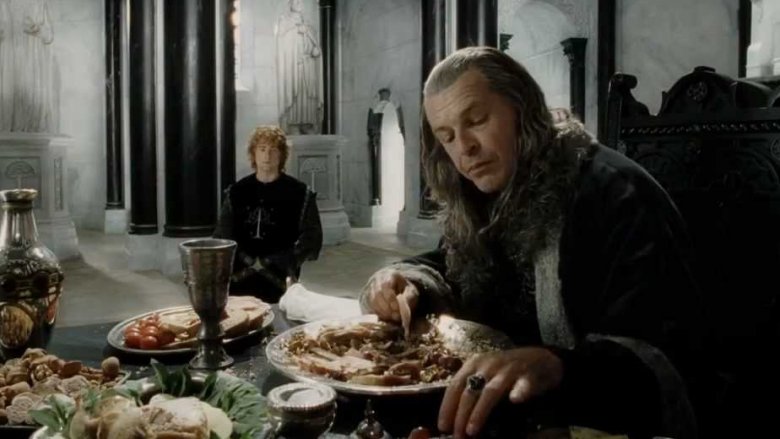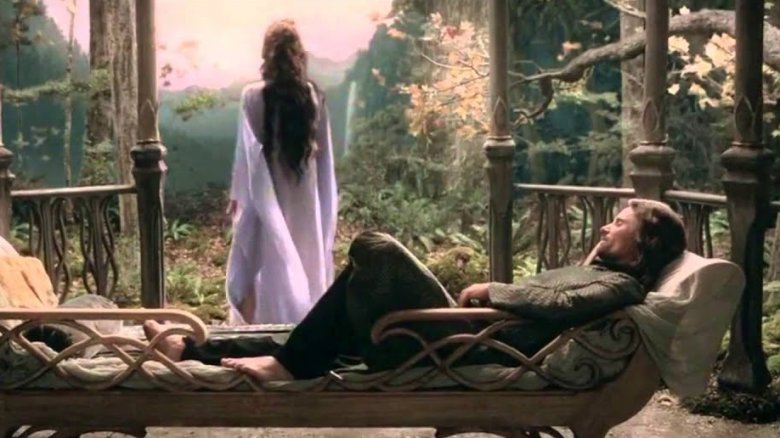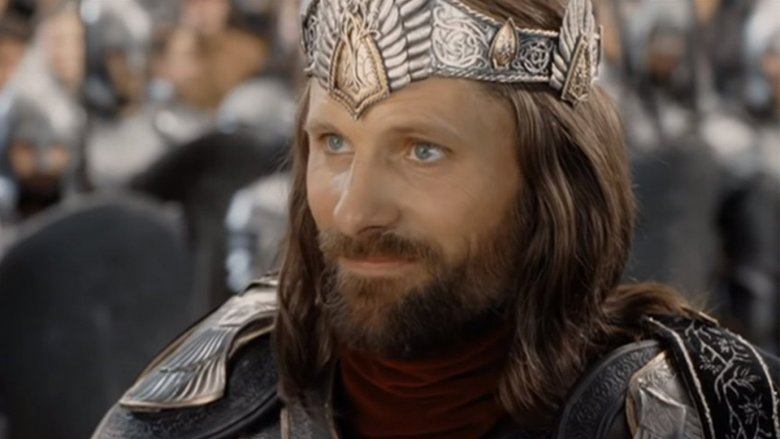Aragorn's Backstory Explained
There isn't a single central character in The Lord of the Rings trilogy. Elves, hobbits, dwarves, men, and wizards all jockey for position as each person comes in and out of the limelight. However, when taken as a whole, there are a few individuals that do stand out from the rest. Frodo, for instance, is absolutely instrumental as the bearer of the One Ring, Gandalf is a key player in the fight against Sauron from the beginning, and huge chunks of the story are narrated from Samwise Gamgee's perspective.
And then there's Aragorn. Chief of the Dúnedain, heir to the throne of Gondor, and the best tracker this side of the Misty Mountains. Make no mistake, the Man of the West is an integral part of the plot. In fact, the entire third book is named after him. But while everyone knows how great Strider is thanks to his heroic exploits during The Lord of the Rings trilogy, it turns out that the king-in-waiting actually had quite an impressive resume before the entire One Ring business even kicked off. If you've ever wondered what, exactly, the 87-year-old ranger was up to in the years leading up to The Fellowship of the Ring, you've come to the right place because we're about to explain Aragorn's backstory.
Aragorn's impressive pedigree
Before launching into the life of the man himself, it's worth taking a minute to talk about his ancestors. After all, it's easy to watch Viggo Mortensen striding around saving the day and then blindly get on the Aragorn bandwagon. But seriously, where does this tramp from out in the wilderness get off claiming the throne of the kingdom? Well, you've got to back up about 6,000 years or so to answer that one.
So let's start exploring Aragorn's backstory. At the beginning of the Second Age, a kingdom of men is founded on the island of Númenor, to the west of the coasts of Middle Earth. The first of the kings of the Númenoreans is a man named Elros, who happens to be the brother of Elrond of Rivendell. While Elrond famously chooses to live an immortal life — the choice is a special family prerogative — Elros opts to live out his life as a mortal man.
Elros is the first of a long line of kings that rules Nûmenor for over 3,000 years. Even when the powerful island nation is destroyed, the bloodline continues to rule over the offshoot kingdoms of Gondor and Arnor on the mainland. Eventually, though, the family line fades into oblivion, ruling a scattered people under the title of the "chieftains of the Dúnedain."
The chieftains of the Dúnedain
Wait a minute, though. What on earth does "chieftain of the Dúnedain" mean? The truth is, Tolkien's works have a lot of complicated layers to them, especially when it comes to family lineage and political positions of power. Not only that, but the man loved titles, alternative names, and monikers in different languages. Gandalf, for instance, has a whole slew of different names depending on the region of Middle Earth that he's in.
All that said, here's the short and simple background to who the Dúnedain and their chieftains are. In Gondor, the last king of the bloodline dies a thousand years before The Lord of the Rings takes place, leaving the stewards in charge of the kingdom until a king should come and reclaim the throne. This is what leads to the Steward Denethor leading the city when it's attacked in The Return of the King.
In the north, though, there are no stewards to serve as long-term place holders. Instead, the kingdom of Arnor is completely destroyed. In reaction to this, the surviving members of the royal family and their descendants eventually head into a sort of semi-exile under the new title of the "chieftains of the Dúnedain." Under this new name, the chieftains rule over the scattered remnants of their people, who quietly fight against the Dark Lord as rangers. The chieftains of the Dúnedain rule for a thousand years before the last one, our boy Aragorn, arrives on the scene.
Growing up in Rivendell
As the last century of the Third Age begins, Aragorn's parents, Arathorn and Gilraen, get married, and little baby Aragorn II (that's our Aragorn) is born one short year later. Two years after that, his father is shot through the eye with an arrow while helping Elrond's sons fight orcs. This leaves toddler Aragorn as the new heir to the thrones of the kingdoms of Gondor and Arnor.
Naturally, this isn't a great position to be in, since Aragorn's people aren't able to properly defend him, and Sauron has servants specifically trying to hunt down and kill off the bloodline. So his distant relative Elrond agrees to take in the child and his mother. In Rivendell, Elrond comes to love Aragorn as his adoptive son. He gives him the name Estel, which means "hope," and he keeps the young Númenorean in the dark regarding his lineage for a long time. It isn't until the lad turns 20 that the elven lord feels his ward is ready for the responsibility. At that point, he tells him his true name and title.
The backstory of a mighty heirloom
When Elrond tells Aragorn who he is, he also takes the opportunity to give him some of the heirlooms of his ancestors. The most important of these is the shards of Narsil, the splintered pieces of a sword that had belonged to Aragorn's ancestors for thousands of years by this time.
The reason a broken sword matters so much has little to do with its battle prowess. While it'd been an excellent weapon back in the day, this sword, in particular, made the history books because it was the weapon that cut the One Ring off of Sauron's hand.
Aragorn's ancestor Elendil had used it in battle against Sauron, but he'd been defeated, and the sword had been broken. However, Elendil's son, Isildur, used the broken pieces to strike out in desperation, cutting off the ring — along with the finger that held it — in the process. After that, the sword shards had been carefully preserved as an heirloom of the royal house, and it's none other than Aragorn himself who would eventually be able to use the reforged sword in battle against Sauron during The Lord of the Rings.
Love at first sight
At 20 years old, Aragorn is doing pretty well for himself. He already has a reputation in battle, and he's just found out that he's the heir to not one but two thrones. The day after Elrond tells him who he really is, he heads out into the woods, strolling along and singing to himself. As he walks, he suddenly runs into a beautiful elf maiden who he's never met before. Aragorn introduces himself and finds out that the bodacious elven woman is none other than Elrond's daughter, Arwen — and yes, that does make them very distant relatives.
At this point, Arwen is already nearly three millennia old, and she's regarded as one of the most beautiful elves that ever lived in Middle Earth. Age differences aside, it's love at first sight for the young man, and he becomes lovesick not long after their first meeting. His mother warns him that, as a mortal man, he's aiming way above his pay grade. Elrond recognizes the lovesick glances in his face, too ... and isn't too happy about it. However, he tells Aragorn that they'll leave the matter for another day, and the forlorn ranger leaves Rivendell soon afterward.
A friend of Gandalf
When Aragorn leaves Rivendell, he heads into some of the wilder regions of Middle Earth. Here, he spends the next few decades developing his skills as a ranger. He also continues to build on his fledgling reputation as a mighty warrior and leader of men. However, before we get too far into the action, it's important to point out one critical friendship that he makes early on in his travels.
Just a few short years into his wanderings, Aragorn meets Gandalf the Grey. The wizard and the exiled king become fast friends, and they even head out on several journeys together. While we've already established that Aragorn is a good warrior at this point, the relationship with Gandalf helps the young man learn a good deal of wisdom, too. Eventually, the pair of wanderers begin to travel together less often, but their well-established friendship carries on over the years until they find themselves once again side by side as the events of The Lord of the Rings unfold.
Fighting in Rohan and a secret trip to Gondor
While the idea of having a wizard by your side is a pretty good bonus for anyone wandering around the wild, that doesn't stop Aragorn from eventually beginning to branch off on his own. This independent streak eventually leads to two very famous journeys in his younger life.
The first of these involves the horse-lords of Rohan. However, we're not talking about Éomer or even Théoden at this point. Aragorn's first visit to the green fields of Rohan takes place during the reign of Théoden's father, Thengel. While very little is reported about his specific actions, it's said in the appendix of The Return of the King that Aragorn fights in Thengel's armies. On top of that, the man himself tells Éomer in The Two Towers that, "I have been in this land before, more than once, and ridden with the host of the Rohirrim, though under other name and in other guise. ... I have spoken with Éomund your father, and with Théoden son of Thengel." In The Return of the King, he also tells Éowyn, "I walked in this land ere you were born to grace it."
However, for all of his time spent in Rohan, the real action doesn't pick up until he heads south into Gondor. That's right, decades before The Lord of the Rings takes place, Aragorn visits the kingdom he would eventually rule. Once again, though, as in Rohan, he goes in "other guise."
Saving Gondor from the Black Ships
One of Aragorn's most triumphant moments in The Return of the King comes when he captures the fleet of Black Ships and uses them to arrive at the Battle of the Pelennor Fields just in the nick of time. However, it turns out that this isn't the first time he's tangled with these piratical foes of Gondor. The first time happened way back when he was still a youngster.
So let's dive into that epic story. After serving in the hosts of King Thengel of Rohan, Aragorn heads south in order to pay Gondor a visit. At the time, he goes by the name of Thorongil, which means "Eagle of the Star." Using this secret identity, he becomes a valued adviser and ally of the steward of Gondor, Ecthelion II. At the time, the maritime people of Umbar — those who have the fleet of black ships later on — are threatening Gondor, and the young adviser offers to deal with the problem.
With the blessing of the steward, Aragorn gathers a small fleet and sails to Umbar, where he arrives at night and burns most of their ships. Aragorn himself kills their leader in single combat and then successfully withdraws his tiny armada with just a few casualties.
Aragorn's backstory with Denethor
One other fascinating development that takes place when Aragorn spends time in Gondor as Thorongil is his run-in with the steward's son, Denethor. Just four years away from becoming the steward himself, Denethor is one of the few Gondorians who's not enamored with the mysterious savior from the north.
The situation isn't helped by the fact that even though Denethor is the heir to his father (the steward), everyone seems to elevate the disguised Aragorn above him anyway. Even Denethor's own dad appears to put him second to the wandering hero, which may go a long way in explaining his future behavior to his own son, Faramir.
The greatest issue between the two men, though, comes in the form of their wizardly affiliations. Denethor is a supporter of Saruman, while Aragorn clearly casts his vote for Gandalf. Of course, Aragorn isn't ready to reclaim the throne yet, so instead of heading for Minas Tirith, he leaves Gondor before Denethor becomes the steward. However, rumors later spread that before he left, Denethor figured out who Aragorn really was. If true, this would go a long way in helping to explain his cold welcome for the ranger from the north during The Return of the King.
Aragorn's further travels
As already mentioned, when Aragorn returns triumphantly to Gondor after the raid on Umbar, he refuses to return to Minas Tirith. Instead, he says farewell to his future subjects and abruptly heads off into the blue. Seriously, the man sends a farewell message to Ecthelion, and then, to the horror of his new friends, he just takes off, traveling towards Sauron's domain no less.
While the rest of his adventures abroad only come in hints, the appendix of The Return of the King tells us, "He passed out of the knowledge of Men of the West, and went alone far into the East and deep into the South, exploring the hearts of Men, both evil and good, and uncovering the plots and devices of the servants of Sauron." And at the Council of Elrond, Aragorn explains, "The leagues that lie between here and Gondor are a small part in the count of my journeys. I have crossed many mountains and many rivers, and trodden many plains, even into the far countries of Rhûn and Harad where the stars are strange."
In other words, after his epic deeds with the Rohirrim and the Men of Gondor, Aragorn disappears from the history books. While the details are virtually non-existent, over the following years, he wanders across the lands of Middle Earth, learning about its people and studying Sauron's plans.
Meeting Arwen again
After Aragorn's adventures in Rohan, Gondor, and the lands beyond, he stops by Lothlórien in order to get some well-earned rest. It's been nearly 30 years since he first left Rivendell at this point, and he's almost 50 years old. He's matured quite a bit during this time, thanks largely to his wanderings, along with the fact that the line of Númenorean kings live very long lives and don't fully mature until well into their first century.
Aragorn happens to arrive in Lothlórien right when Arwen is there, visiting her grandmother, Galadriel. The two reunite in the Golden Wood, and this time, Aragorn isn't the only one feeling all the feels. Rather than seeing him as a young buck head over heels in love, Arwen now sees this young king in exile as a sober, mature man, and the two seriously fall in love. When Elrond hears about it, he reluctantly gives his permission to the arrangement, but he says they can only marry if Aragorn defeats Sauron and becomes king.
Hunting Gollum
We don't hear much more about Aragorn's specific activities for quite a while after the events in Lothlórien. At some point, he visits Moria, although he doesn't love the experience. In his own words, "The memory is very evil." So yeah, he doesn't want to return there.
He shows up one more time before The Fellowship of the Ring. Not long after Bilbo's long-expected birthday party, Aragorn agrees to help Gandalf hunt down the mischievous Gollum. While he fails to find the tortured soul before he's captured by Sauron and leaks some important information about the Shire, Aragorn does eventually track the wretched creature down.
He catches him on the edges of the Dead Marshes — the same swampy area that Gollum leads Frodo and Sam through later on. The two don't get on very well, as Gollum bites his captor, leading Aragorn to roughly gag him and lead him on a leash. According to his arrangement with Gandalf, the ranger takes Gollum on a long trek north to Mirkwood, where he leaves him in prison for the wizard to question at a later date. The next time we see Aragorn is in Bree during The Fellowship of the Ring.
Aragorn's long reign and willing death
Of course, everyone knows what happens during The Lord of the Rings. Aragorn proves himself worthy of the crowns of Gondor and Arnor, and ultimately, he becomes the king of both kingdoms. His success opens the doors for him to finally reunite with Arwen, and the two become king and queen of the ancient realms.
Aragorn rules the reunited kingdom under the name Elessar, which means "Elfstone," for 120 years. During this time, among many other things, he restores Orthanc, the tower that had been flooded by the Ents, and he names Faramir the prince of Ithilien. He also reaffirms the alliance with King Éomer of Rohan and declares the Shire to be a free land under his protection. Eventually, at the ripe old age of 210, Aragorn becomes weary and willingly surrenders his life, bringing an end to his long and illustrious career in Middle Earth. Arwen, now mortal, dies in the following year from grief, and their son becomes the new king of the reunited realm.
